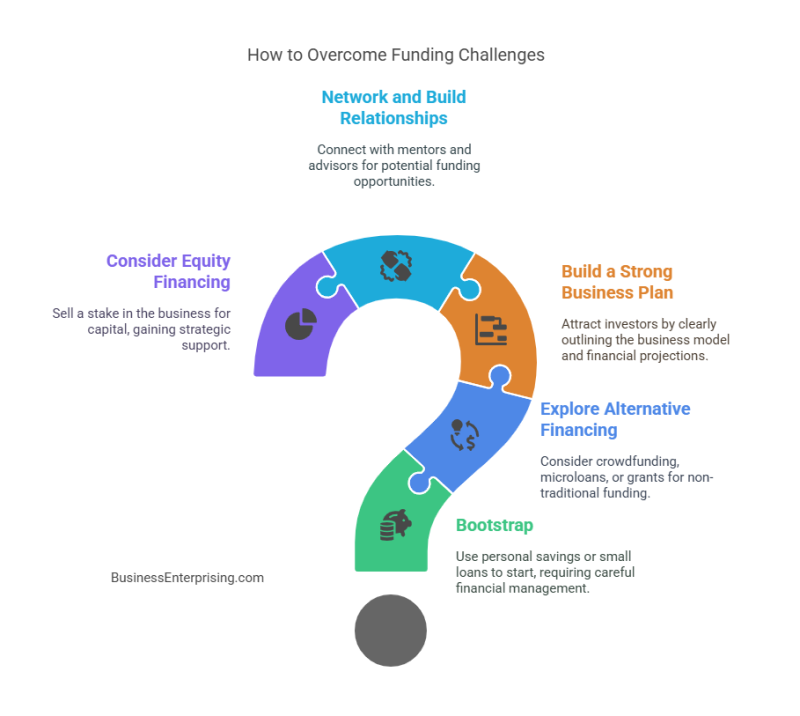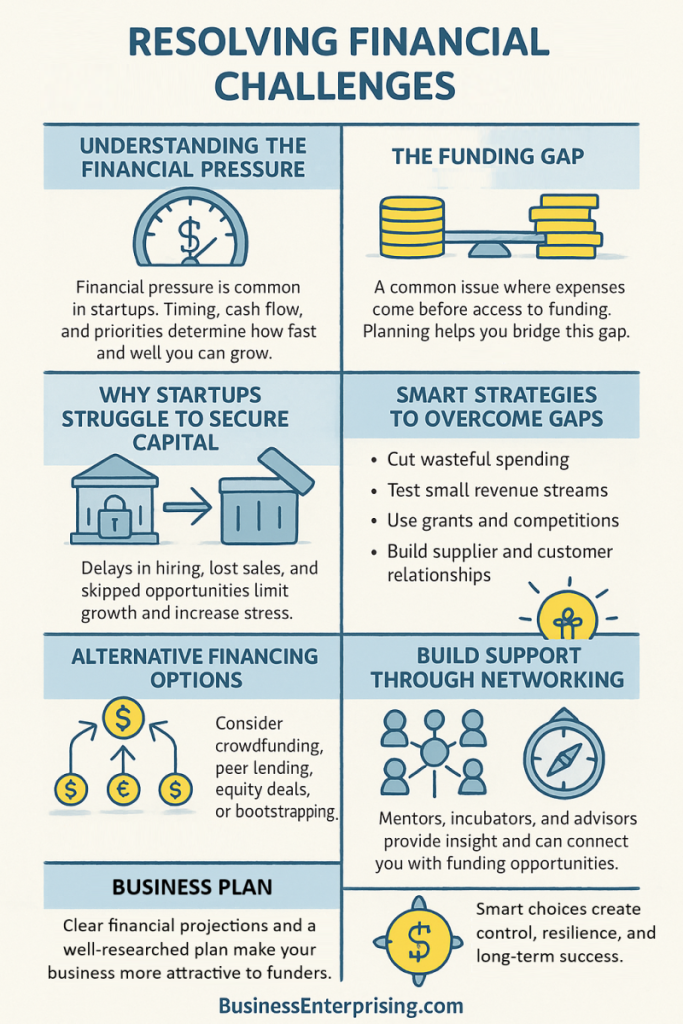
Many business owners face the same early hurdles. You might struggle to cover operating costs or fund new marketing efforts. Additionally, you may find that outside funding is hard to secure without proof of traction. These problems don’t mean your idea is weak. However, they do require a plan and steady execution.
Therefore, it helps to step back and assess your actual needs. Focus on what drives revenue, not just what looks important. Additionally, think about what tasks you can delay, delegate, or do differently. These choices help you stretch your cash without cutting quality.
Some of the most successful founders build lean from the start. They avoid waste, test early, and pivot fast. However, this discipline doesn’t come naturally to everyone. You may need to train yourself to act based on data instead of emotion. Resolving funding problems often starts with small wins. Therefore, track results often and respond quickly to change. If you stay focused on solving customer problems, money follows.
Understanding the Funding Gap
The funding gap affects more entrepreneurs than most people realize. You may have a great idea, but still lack enough capital. This gap appears between early expenses and access to traditional funding. Many founders struggle to move forward during this stage.
Additionally, banks and investors often want proof of revenue. However, you may need funds to reach that point. This mismatch creates delays and missed chances. Therefore, understanding your actual funding needs is an important first step. You need to know how much it takes to launch, operate, and grow.
Some business owners rely on personal savings or credit. Others ask friends or family for help. These options may work short term, but they add risk. Therefore, you should explore safer alternatives as early as possible. Local grants, pitch competitions, and microloans are worth considering. Each may help fill the gap without adding long-term pressure.
Resolving financial challenges in entrepreneurship requires clear planning and creative thinking. You should build a budget and update it regularly. Additionally, it helps to show lenders or investors that you can manage cash flow. This builds trust and increases your funding options.
Every business faces slow periods. You may need a buffer to get through them. Therefore, plan for gaps, not just profits. If you understand the limits of your funding sources, you can make smarter decisions. That kind of discipline helps you stay in control and avoid bigger problems later.
The journey from concept to successful business often requires substantial capital. Entrepreneurs need funds for various purposes, including product development, marketing, hiring staff, and operational expenses. However, many startups find themselves in a precarious position where they lack the necessary financial resources. Several factors contribute to this funding gap:
High Initial Costs:
Starting a business typically involves significant upfront costs. These can include purchasing equipment, securing office space, and investing in technology. For many entrepreneurs, especially those without personal savings or access to loans, these costs can be prohibitive.
Risk Aversion Among Investors:
Investors, including venture capitalists and angel investors, are often cautious about funding new ventures. Startups are inherently risky, and the potential for failure is high. This risk aversion can make it challenging for entrepreneurs to secure the capital they need.
Limited Access to Traditional Financing:
Banks and traditional financial institutions often require a proven track record and collateral before providing loans. Startups, especially those in their infancy, typically lack these requirements, making it difficult to obtain bank financing.
Economic Uncertainty:
Broader economic conditions can also impact funding availability. During periods of economic downturn or uncertainty, investors and financial institutions may become more conservative, tightening the flow of capital to new businesses.
Impacts of Funding Shortages
Funding shortages can slow or even stop business growth. Without cash, you may delay hiring, cut marketing, or pause product development. These delays often lead to lost momentum and missed revenue. Additionally, your team may feel the pressure of limited resources.
Customers can also notice the effects. If service levels drop or quality slips, trust becomes harder to maintain. Therefore, you may see lower sales at a time when you need more. This pattern creates a cycle that’s difficult to break without added capital.
You may also face stress from unpaid bills or personal debt. These pressures affect your focus and decision-making. However, small financial issues often grow if you don’t act early. Creating a financial plan helps you spot gaps before they get worse.
Additionally, limited funds can make you skip opportunities. You might pass on new tools, training, or marketing tests that would help you grow. This delay gives competitors more room to gain market share. Therefore, every missed investment can have long-term impact.
Resolving financial challenges in entrepreneurship takes more than cost-cutting. You need to stay proactive with budgets, cash flow, and planning. Track income and expenses weekly, not monthly. Additionally, seek small wins that bring in revenue quickly. These actions give you more control when funds are tight.
A funding shortage is not always the end. If you act early, you can recover and grow. Keep your focus on what works, stay lean, and adjust often.
The lack of funding can have severe implications for startups, affecting their ability to operate and grow effectively. Some of the key impacts include:
Stunted Growth:
Without adequate funding, startups may struggle to scale their operations. This can limit their market reach, reduce their competitive edge, and ultimately impede growth.
Operational Challenges:
Day-to-day operations can become a struggle when funding is tight. Entrepreneurs may face difficulties in paying salaries, purchasing necessary materials, or investing in essential technologies, which can affect overall business efficiency and productivity.
Increased Stress and Burnout:
The financial pressures of managing a cash-strapped startup can take a toll on entrepreneurs. The constant stress of balancing the books and finding new funding sources can lead to burnout, impacting both personal well-being and business performance.
Missed Opportunities:
A lack of funds can prevent startups from seizing new opportunities, such as entering new markets, launching new products, or capitalizing on favorable market conditions. This can hinder long-term success and sustainability. Resolving financial challenges in entrepreneurship can alleviate these complications.
Strategies for Overcoming Funding Challenges
Overcoming funding challenges takes focus, flexibility, and clear planning. You need to make smart decisions with the resources you already have. Start by cutting waste. Small savings add up quickly when tracked carefully. Therefore, review each expense and reduce anything that doesn’t support sales or customer service.
Additionally, consider testing new revenue streams. For example, you might offer a smaller version of your product or sell digital content. These changes can bring in quick income with low overhead. However, avoid adding complexity that stretches your team too thin.
You can also explore funding outside of loans and equity. Grants, pitch contests, or early customer deposits can help fill short-term gaps. These options often take effort but don’t carry long-term repayment pressure. Therefore, they allow more flexibility while you grow.
It also helps to build strong relationships with suppliers or partners. Some may offer extended terms or temporary discounts. Additionally, you can ask loyal customers for referrals or early renewals. These conversations may feel uncomfortable, but they often lead to helpful support.
Resolving financial challenges in entrepreneurship takes more than cutting costs. You need to make decisions based on data and daily results. Therefore, track cash flow every week and adjust your plan often. These steps help you stay informed and reduce future surprises.
Stay focused on what works. If a tactic brings results, do more of it. If it doesn’t, pause or cut it quickly. You can survive short-term gaps by staying lean and adapting fast.
Despite these challenges, there are several strategies that entrepreneurs can employ to navigate the funding landscape and secure the resources they need:
Bootstrap Where Possible:
Many successful entrepreneurs start by bootstrapping their businesses, using personal savings, revenue from initial sales, or small loans from family and friends. This approach requires careful financial management but can provide the necessary runway to prove the business concept and attract larger investments later.
Explore Alternative Financing Options:
Beyond traditional bank loans, there are several alternative financing options available. These include crowdfunding platforms, peer-to-peer lending, and microloans. Each of these options has its own set of requirements and potential benefits, so it’s important to research and choose the one that best fits the business’s needs.
Build a Strong Business Plan:
A well-structured business plan is crucial for attracting investors. It should clearly outline the business model, market opportunity, financial projections, and growth strategy. Demonstrating a thorough understanding of the market and a clear path to profitability can make the business more attractive to potential investors.
Leverage Grants and Competitions:
Many governments, non-profits, and private organizations offer grants and business competitions aimed at supporting startups. These can provide non-dilutive capital and valuable exposure. Entrepreneurs should actively seek out and apply for these opportunities.
Network and Build Relationships:
Building a strong network of mentors, advisors, and industry contacts can open doors to funding opportunities. Networking events, industry conferences, and startup incubators can provide valuable connections and advice.
Consider Equity Financing:
Equity financing involves selling a stake in the business in exchange for capital. This can be done through venture capital firms, angel investors, or equity crowdfunding platforms. While it means giving up a portion of ownership, it can provide significant funding and strategic support.
Conclusion
Funding issues are a common part of building a business. You may face delays, but you still have options to move forward. Many founders make progress by staying flexible and rethinking their spending. Therefore, planning and focus often matter more than the size of your budget.
Additionally, small changes can produce steady improvements. You can tighten expenses, test offers, or revisit pricing to boost cash flow. These steps may seem minor at first. However, they help you maintain control when conditions change.
You should also stay open to feedback. Talk with mentors, peers, or advisors who understand small business finance. Their input may reveal blind spots or savings you missed. Additionally, their support can help you stay motivated when things feel uncertain.
Resolving financial challenges in entrepreneurship takes steady effort and real discipline. You need to monitor your cash, review your goals, and adjust often. These actions help protect your progress and avoid deeper losses. Therefore, the earlier you act, the better your results will be.
Keep your focus on what drives revenue and supports your customers. Avoid distractions that don’t lead to real value. If you stay lean, test often, and make smart choices, you can push through funding gaps.
Each step you take makes your business more resilient. Money will always matter, but clarity and consistency matter more.


